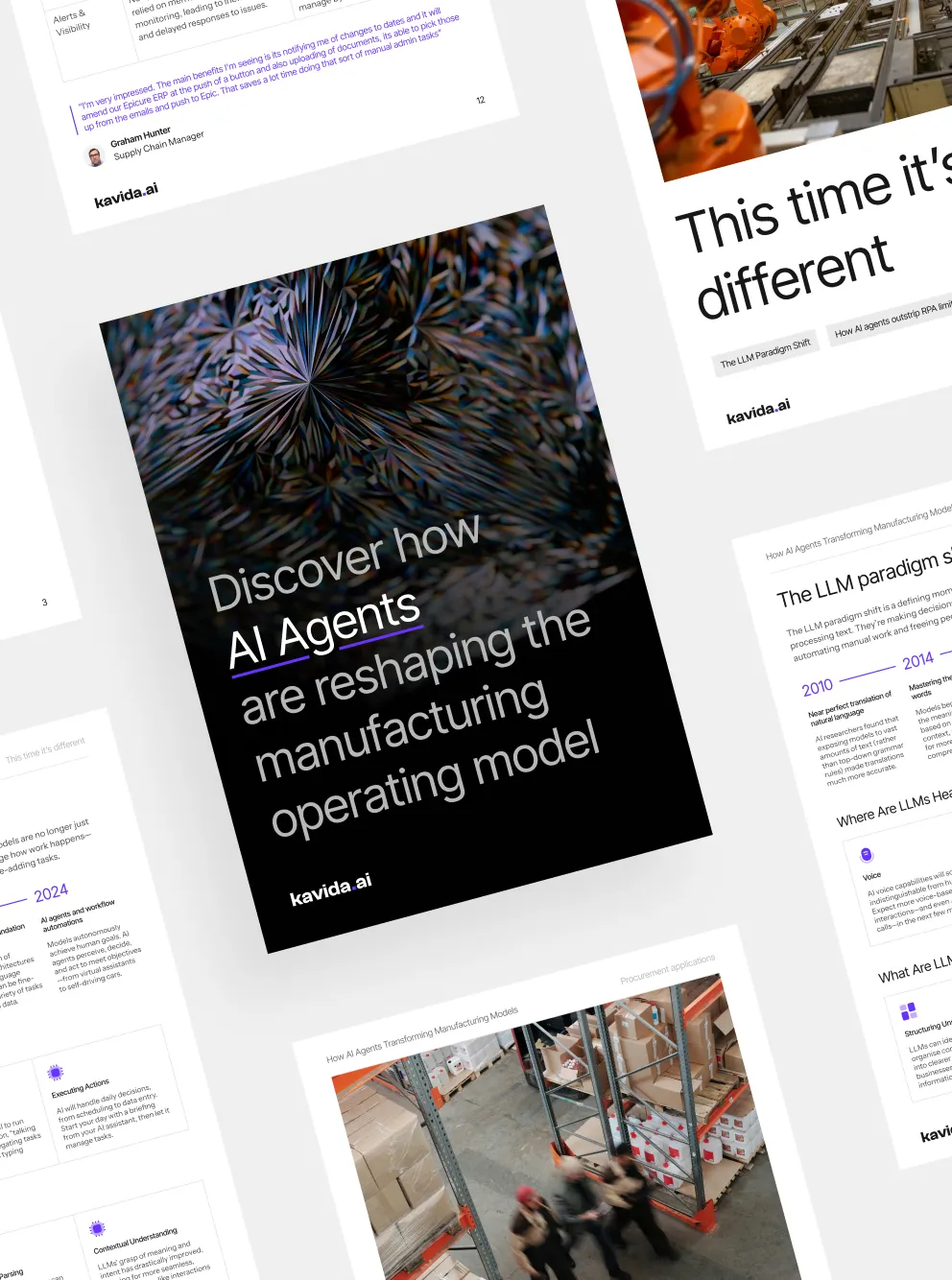
Discover how AI agents are reshaping the manufacturing operating model

Hi, I’m Alison!
Share your details, and I’ll give you a call in minutes to see how we can assist.

Luke Tomlinson on Why Crisis Could Be Procurement's Biggest Opportunity Yet
Luke Tomlinson, Global Category Manager at RS Integrated Supply, shares why economic uncertainty and technological transformation might be procurement’s biggest opportunity yet, how keeping humans at the core of innovation could be our unspoken advantage, and why creativity might matter more than ever in a tech savvy world.
Luke has successfully managed business-critical spend in the B2B distribution and telecommunications sectors, with experience spanning SMEs and FTSE 100 companies. He has led cost-saving initiatives delivering significant financial benefits while creating commercial value and driving transformative change.
Luke also navigated supply chain challenges during COVID within a PPE and safety distribution company, ensuring continuity under unprecedented conditions. In a FTSE 100 company, Luke grew a small, low-importance category by 40%, transforming it into a revenue-generating segment. He has also led greenfield operations in an SME, implementing an ESG framework, achieving 30% basket cost savings, and introducing new governance systems.
Transactional Procurement
Procurement is often viewed as transactional, but you’ve talked about the need for a more strategic approach. What do you think defines a truly strategic procurement function?
In one phrase, I’d say it’s looking further into the future, rather than just looking at the now. Strategic procurement is about having a proper long-term vision. Disruptions happen, so you need risk mitigation strategies, supplier diversification, and real strategic partnerships where you’re working with people externally for joint growth in the business.
If you’ve got a high workload, which a lot of people in procurement have, it’s difficult to look past the next quarter or the next six months. That’s where it becomes transactional.
That’s partially on resources, but it’s also on prioritisation. It could be the partners you’re working with. It could be the way you’re thinking of technology – particularly AI and automation – and how it can help procurement teams focus on driving long-term value. Are you automating as much as you can to reduce that workload?
And what ways do you think technology, AI and automation can help procurement teams focus on driving long-term value?
We (procurement) are being reactive to current demands and I think the more organisations lean into technology, it opens doors to different ways of streamlining processes or removing processes if need be. People will be able to look more into strategy.
Procurement wants to be strategic but can’t because of these restrictions.
Sustainability
95% of procurement leaders recognise ESG as a growing priority for 2025, and many will be cracking down on this in their operations. What practical steps should teams be taking so that they’re not just ticking the boxes but genuinely driving impact?
I did a seminar recently on ESG in the supply chain and one of the topics we covered was greenwashing. The problem at the moment, globally, is that regulation is almost non-existent for a lot of areas of ESG. Until we’ve got frameworks in place—maybe starting in the public sector—companies that are genuinely giving that social impact are the ones driving it forward.
There are different ways of doing it but at the moment my core piece of advice is: one, making sure your partner’s values align with your own. This is where the human element of procurement comes in, when you’re meeting a supplier and discussing a strategy, you can generally suss out quickly if it’s just a tick box exercise.
Second, putting in place an auditing measure and using an external auditor as well whose sole job is to investigate ESG claims and the suppliers. This can be more costly for smaller businesses but is the most impartial way of doing this.
Soft Skills
What is an important skill that procurement professionals should be looking to develop?
Procurement is one of those professions, like Finance, that you would look at and think creativity isn’t needed, but I believe it is. Not in the traditional form of creativity. In procurement, it’s more about storytelling to get that stakeholder buy-in.
To a degree you need to animate yourself. When speaking with suppliers, you’re selling them an opportunity. Selling them a story. Procurement is a people-centered department, and it’s important to stay connected to people. That creativity piece comes back to how you tell that story, tie that into wider strategy and get buy-in.
What excites you most about the future of procurement?
There’s a lot that has happened in the last few years for a lot of countries. The world needs more optimism.
There’s two sides to it. On one hand, it’s going to drive us to be more efficient. The world’s a scary place economically at the moment, so we’ve got to move beyond being reactive and look at strategy.
It’s going to force us to be more creative in how we create efficiency and navigate these challenges. Come 2025, I’m definitely going to try and educate myself on technology, because that’s one of the key drivers that will keep us motivated and enable us to be more strategic and mitigate some of that economic risk.
And I’m a people person. I think relying on tech to do all the boring admin and repetitive stuff will enable me to be with people more.
Curious about Luke’s background? Check out his full profile here.
Disclaimer: This interview has been edited for length and clarity.

Deana manages community efforts and creation of thought leadership material at Kavida. For inquiries, reach her at deana@kavida.ai.

